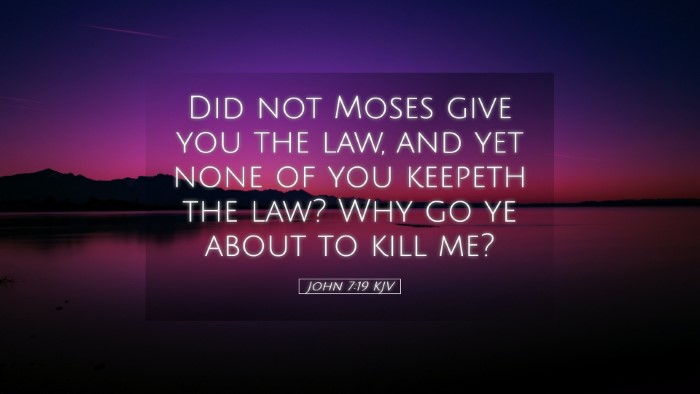Commentary on John 7:19
Verse: John 7:19 - "Did not Moses give you the law? yet none of you keepeth the law. Why go ye about to kill me?"
Contextual Overview
In this passage, Jesus addresses the Jewish leaders during the Feast of Tabernacles.
His rhetorical question serves as a profound indictment of their understanding and adherence to the Law of Moses.
This conversation highlights the tension between Jesus and the religious authorities, revealing their failure to recognize
the purpose of the Law and the deeper spiritual truths that Jesus embodied.
Analysis of Key Themes
The Law of Moses
Jesus points out that Moses, regarded as one of the greatest prophets and lawgivers in Jewish history, provided the Law.
However, despite having received such divine instruction, the leaders fail to uphold it.
Matthew Henry notes that the Law was given to reveal sin and guide God's people towards holiness.
The question implies that the leaders misconstrued the intentions of the Law, and their actions are contrary to its purpose.
Failure to Obey
Jesus's accusation that none of them keep the Law underscores their hypocrisy.
Albert Barnes emphasizes that this statement exposes their moral and spiritual failures;
the ones who claim to be the guardians of the Law are, in fact, transgressors.
This challenges their authority and prompts reflection on the nature of true obedience and righteousness.
Intent to Kill
By posing the question, "Why go ye about to kill me?" Jesus confronts their intentions directly.
Adam Clarke elaborates that this statement foreshadows the ultimate rejection and persecution that Jesus would face.
It illustrates the irony of the situation: those who were supposed to uphold God's commandments
turn against the very embodiment of God's will.
Theological Implications
This verse carries profound implications for theology, soteriology, and the understanding of moral law.
It reflects the inadequacy of the Law in producing righteousness without the transformative power of Christ.
1. The Purpose of the Law:
The Law serves as a tutor that leads to Christ (Galatians 3:24). Without genuine understanding and heart transformation,
mere legal adherence proves insufficient.
2. The Nature of True Righteousness:
Righteousness is not merely external compliance but a matter of the heart. The challenge Jesus poses encourages
a move beyond superficial adherence to deep, transformative faith that results in action.
3. The Role of Jesus as the Fulfillment of the Law:
In expressing the failures of the religious leaders, Jesus reveals Himself as the one who fulfills the Law.
He embodies the true intention behind the commandments—a call to love, justice, and mercy.
Applications for Today
As we reflect on John 7:19, it becomes essential to evaluate our understanding and application of God's commands.
- Self-Examination: Are we, like the Jewish leaders, failing to keep the spirit of the Law while adhering to its letter?
- Authenticity in Faith: Our faith must not just be practiced outwardly; it should reflect genuine transformation within.
- Understanding the Heart of God: We must pursue a relationship with God that goes beyond rules and regulations, embracing the fullness of grace and truth found in Jesus.
Concluding Thoughts
John 7:19 encapsulates a critical moment of confrontation between Jesus and those who believed
they upheld the Law while failing to recognize the need for a savior.
The enduring message challenges all readers—pastors, theologians, and laypersons alike—to reassess
their understanding of righteousness, justice, and the nature of God's commandments,
ultimately leading to a deeper relationship with the one who fulfilled the law and offers grace.


